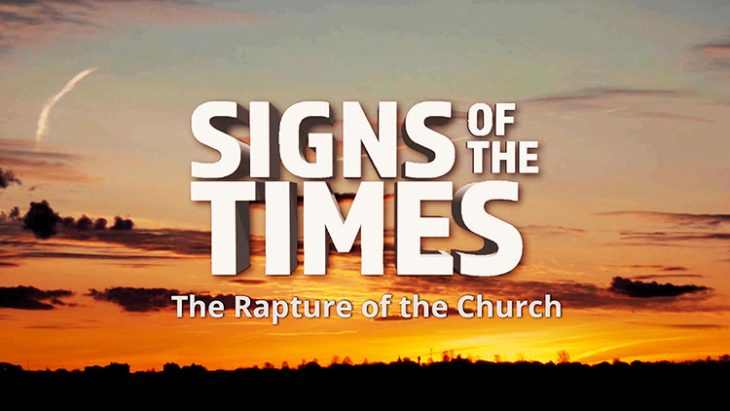Is the teaching of the Rapture “too new to be true”?
This and other questions about the Rapture sent in to us were answered by Dr. David Reagan, Nathan Jones, and Tim Moore on our television program Christ in Prophecy.
Nathan Jones: This “too new to be true” objection to the teaching of the Rapture we hear all of the time. I think the best book on this topic ever written, called Dispensationalism Before Darby by Dr. William Watson, blows the “too new to be true” objection right out of the water. He’s a research and teaching professor who dug deep into the ancient Church archives stored in England to explore the Church writings from over the last 2,000 years. He’s a great intellect who’s discovered many, many writings which show the teaching of the Rapture predates the early 1800s. Dr. Watson told me he found so many writings that he’s actually incorporating more of his research into a sequel to his first book.
It’s common knowledge among Church historians that Barnabas, Papias, and Justin Martyr taught about the element of immanency in the Second Coming. Between the 1500s through the 1800s, Joseph Mede, Increase Mather, and James McKnight separated the Rapture from the Second Coming. So, this idea that John Darby back in the 1800s had invented a Pre-Tribulation Rapture teaching because he heard ecstatic utterances from some 15-year-old girl named Margaret MacDonald, and boom, now we’ve got this Pre-Trib Rapture view that’s just too new to be true, well that’s not true at all. The Darby story is historical fiction.
What we have with the teaching of the Rapture is a reawakening of the teachings of Jesus and the Apostles from the first century. The Church buried the concept under Augustine and throughout the Dark Ages. The Dark Ages were named as such for a reason because they had lost the practice of literally interpreting the Bible, and so adopted the practice of spiritualizing Scriptures. With the reawakening of the literal interpretation of the Bible, we are back to a true understanding of what the Bible literally tells us — the Rapture and the Second Coming are separate events, and the Rapture will happen before the Tribulation.
Tim Moore: I think that is so important that we can point back to writers like John Darby in England who lived in the early 1800s and was part of the Plymouth Brethren Movement, but he wasn’t the first to teach about the Rapture. Of course, I’m thinking about the Pilgrims in the 1600s. They popularized the Rapture teaching once again. But, we really can go as far back to the original writings of Paul and of John and of Peter who believed in the imminence of the Lord’s return, even in their day and age. William Blackstone in 1878 wrote his famous book, Jesus is Coming, which points this fact out.
Dr. Reagan: You made a really good point about the Dark Ages. People need to understand that Saint Augustine in about AD 400 wrote a book called The City of God which claimed that all of end time Bible prophecy should be spiritualized. He didn’t take any prophecy literally. Augustine actually claimed the Church was living in the Millennium right now! The Church adopted his errant teachings because they gave great importance to the Church as God’s Kingdom on earth and the Pope as the spokesman for God. The Church in the Middle Ages believed all of the nations should submit themselves to the Pope.
And so, the Church bought into Augustine’s non-literal interpretation of the Scriptures. Nobody else was ever allowed during the Middle Ages to disagree with his position. The people really couldn’t disagree with him either because they didn’t have the Word of God, because in the Middle Ages they didn’t have printing. The only copies of the Bible were very costly handwritten copies, and the average person also couldn’t read or write.
That situation didn’t change until two things happened. First, the invention of the printing press, and second, the translation of the Bible into common languages. Once people could get a hold of their own copy of the Bible in their own language, and they began to read the Bible, they realized the Church’s teachings weren’t lining up with what the Word of God says. It wasn’t until the 1700s that people began to recognize that the Bible foretold that Jesus was coming back, and when He did He was going to reign for a thousand years. The people began to believe that the Bible means what it says.
With this renaissance of the literal interpretation of the Bible, Christians began to notice there’s a difference between what’s taught in 1 Thessalonians 4 about the Rapture and what’s taught in Revelation 19 about the Second Coming. There was clearly some difference there, so the people began to revisit the idea of the Rapture apart from the Second Coming. The concept of the Rapture wasn’t something that just fell out of Heaven overnight, or that John Darby dreamed up overnight.
Dr. Watson mentioned that while in England he had discovered books that he doesn’t believe anybody has read for over 350 years, and yet those authors were talking about a Pre-Trib Rapture. Either in support or else they are refuting somebody who was evidently teaching about a Pre-Trib Rapture, but the Rapture concept had clearly been around long before Darby.
Tim Moore: Some of the mantras of the Reformation Movement such as “Grace alone” and “Scripture alone” were new concept to those who had been raised under Roman Catholic and Eastern Orthodoxy. Those were not new concepts either, just buried by the Dark Ages.
Dr. Reagan: When Martin Luther taught the concept that Christians are saved by grace through faith and not by works, the number one argument of the Roman Catholic Church was, “That’s too new to be true.” They claimed none of the Popes and none of the Early Church Fathers had ever taught that. Luther’s response was fantastic, for he basically said, “Well, the real Church Fathers did, like Jesus and Paul and Peter.”
Tim Moore: Yes, they certainly did. We can go back to the original biblical texts and realize the Rapture is certainly not a teaching that’s “too new to be true.” It can be found in the very Word of God.
In the third segment where we answer your questions about the Rapture, we’ll see if any events need to proceed the Rapture before it can occur.







